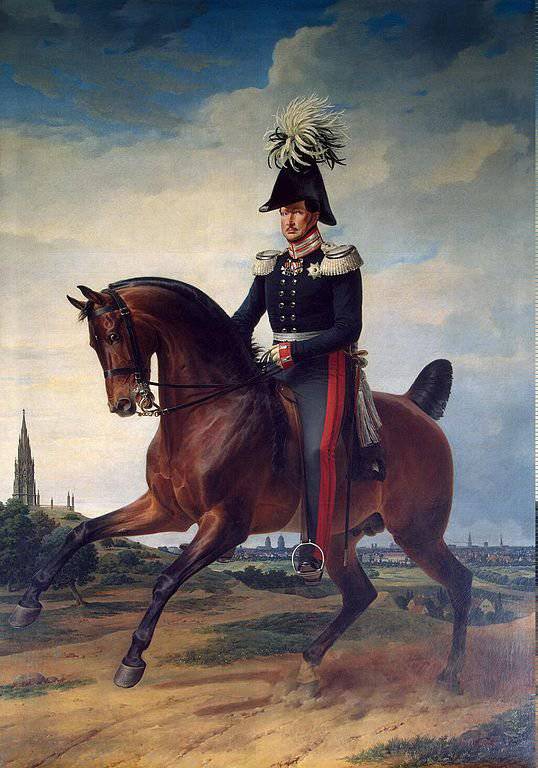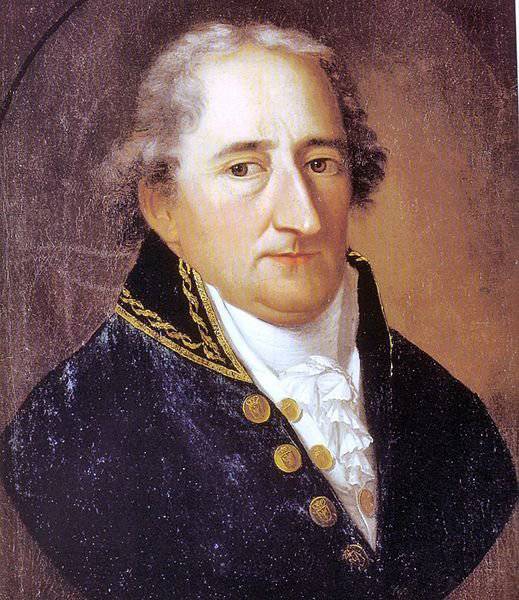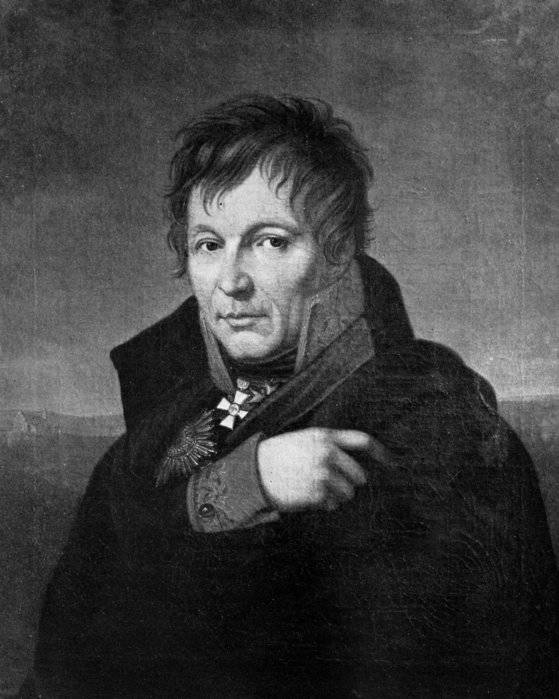Towards the 1812 War of the Year: Russia and Prussia

Friedrich Wilhelm III
The Prussian armed forces were utterly defeated by Napoleon's troops in 1806, and Prussia continued to exist as a state only thanks to the insistent requests of the Russian Emperor Alexander. One of the conditions of the Tilsit peace between Russia and France was the preservation of the sovereignty of Prussia. But despite this, the Treaty of Tilsit was a heavy blow to Prussia. The state lost the Polish lands obtained during the division of the Commonwealth. Russia went Belostok District. Prussian provinces on the left bank of the Elbe became part of the Westphalian kingdom. Defeat in the war 1806-1807. humiliated the proud Prussian nobility, the Prussians believed that they had one of the best armies in Europe.
In 1807, the French emperor put another humiliating condition - forced to pay a contribution in 140 million francs and agree to limit the armed forces to 42 thousand people. Before paying the indemnity, the French troops occupied all the major fortresses of Prussia along the Oder River - Glogau, Kustrin and Stettin. In the fall of 1808 of the year at the Erfurt Congress, the Russian emperor achieved a reduction in the amount of indemnity to 120 million francs, an increase in repayment terms and a softening of the categorical requirements of Napoleon Bonaparte about Berlin’s participation in a possible war with Austria (the Franco-Austrian war would begin in 1809).
Severe defeats and threats to the survival of Prussia highlighted a number of leaders who conducted a series of political, economic and military reforms aimed at strengthening the country. Baron Heinrich Stein made an attempt to reform the economy of Prussia, according to the English model, as early as 1804 - 1807, when he became Minister of Commerce, Industry and Finance. But his plans did not find understanding with the king, and he was dismissed. Under the conditions of the heavy defeat of Prussia, Stein’s experience and ideas were in demand. Stein published an appeal for reform, was returned to the capital by the king, and in October 1807 headed the government of Prussia. By November 1808, despite the resistance of the conservative nobility, Stein carried out a whole package of important political and economic reforms. The law 1807 of the year proclaimed the abolition of the personal dependence of the peasants, also the possibility of alienation of the land at the request of the owner, it was possible to acquire the land to peasants and burghers. In November, the municipal reform was carried out on 1808, it introduced municipal self-government. At the same time, an administrative reform was carried out, which eliminated the absolutist management procedure in state institutions and allowed the establishment of a number of new ministries (military, domestic and foreign affairs, justice and finance). However, as early as the end of November, 1808 was resigned as a result of opposition from the German nobility (Junkers) and court intrigues. But his experience was in demand in Russia - in 1812, at the invitation of the Russian emperor, he entered the Russian service, became one of the organizers of the Russian-German legion, helped prepare the uprising in Germany against the French, participating in the organization of the partisan movement. At the Vienna Congress 1815, Stein represented the Russian Empire.

Prussian statesman and politician Heinrich Friedrich Karl vom und zum Stein.
The case of Stein in Prussia was continued by Prince Carl August von Gardenberg. He also came from a noble family, in 1807, he wrote a memorandum in which he insisted on urgent reforms. In 1810, Hardenberg was appointed State Chancellor of Prussia, and remained in that position until his death in 1822. His government continued and deepened von Stein's reforms: in 1811, freedom of industrial and handicraft activity was introduced, workshops were abolished, and peasants were allowed to buy out feudal obligations.
Reforms in the military sphere were carried out under the leadership of Gerhard von Scharnhorst. In 1807, he headed the General Staff and became chairman of the commission on the reorganization of the army, and in 1808, he headed the military ministry. Lepold von Boyen, August von Gneisenau, Karl von Grolman and Karl Clausewitz became his closest assistants in the military reforms. Scharnhorst needed to create a new Prussian army capable of withstanding the French military machine. Scharnhorst was a supporter of universal conscription, which made it possible to have significant trained reserves. But due to the opposition of the Conservatives and the pressure of Napoleon (he limited the Prussian army 42 thousand), this idea had to be postponed. The general laid the foundation for general compulsory military service, demanding that young people of noble and rich families and with a good education first serve as ordinary soldiers. He planned to establish a landwehr (secondary military formations and the category of military service reserves of the 2 line) and a landsturm (militia during the war). The French emperor opposed the creation of a landwehr, therefore, in order to form an adequate supply of trained soldiers, they would be allowed to go into military service as soon as they received a minimum of military skills. The Landwehr Act could only be introduced in the 1813 year. In addition, the bases of production were changed to officers, in the first place the special education of the person, and not the noble origin, was put forward. The treatment of the rank and file, where noblemen and wealthy burghers now served, became more humane, corporal punishment was abolished. Under pressure from Paris, Scharnhorst was dismissed, but he remained the unofficial leader of the Prussian army.

Gerhard Johann David von Scharnhorst.
In 1811, Berlin was again in a situation of choice — the war of France and Russia was advancing. Scharnhorst traveled to Petersburg and Vienna to probe the situation to create a new anti-French coalition. At the same time, Berlin learned about the new threat to the existence of the state. The memorandum of the Minister of Foreign Affairs Jean Baptiste Champagne (Duke of Cadorsky) was brought to the attention of the Prussian envoy to France Kruzemarck. The document said about the division of Prussia, if it will act in the war on the side of the Russian Empire. Blackmail is quite a success. The Prussian king began to take steps for rapprochement with France. Frederick William III sent Count Gazfeld to Paris, who was ordered to form an alliance with the French Empire. In the instructions that Gatzfeld issued to Chancellor Hardenberg, it was stated: "Let Napoleon forget our sins and deign to bind Prussia to himself in a way that is worthy of his greatness ...". The French emperor ignored the first attempt to conclude an alliance.
14 May 1811, the French ambassador Kruzemark repeated the proposal for a union of France and Prussia. Berlin put forward several conditions to create a favorable environment: reduce the size of the indemnity, withdraw the French troops from the fortress of Glogau and give "guarantees of the independence and integrity of the current borders and possessions of the king." The Prussian king did not report anything on remuneration for participation in the war against Russia. But he was counting on the “friendship and generosity” of the French emperor, hoping to get the Russian Baltic states in return for the lost Polish lands. Napoleon, in turn, was in no hurry to answer, because he did not want to disclose his plans for the Russian Empire, trying to misinform European courtyards. Back in April, 1811, the French ambassador to Prussia, Saint-Marsan, told Chancellor Hardenberg that no war between Russia and France was foreseen. In June 1811, the new Foreign Minister of the French Empire Mare, the Duke of Bassano, informed the Prussian Chancellor that the military preparations of the Prussian armed forces might arouse the suspicions of St. Petersburg, so they must be suspended.
The uncertainty of the situation frightened the Prussian king, so he decided to simultaneously ask Alexander for help. General Scharnhorst was sent to St. Petersburg in September 1811 - he headed circles in Prussia who wished to union with Russia. Scharnhorst expressed the opinion that only Russia can stop further seizures of France. He considered the union of Prussia with France dangerous for the future of his homeland. In Petersburg, they guessed about the double play of Friedrich Wilhelm III, but at the same time they understood the importance of engaging Prussia in an alliance with Russia. The active participation of the strong army of Prussia in the war against Russia was extremely undesirable. Negotiations were started. Their result was the signing of the October 17 convention of the year 1811, it was signed by Scharnhorst, Barclay de Tolly and Rumyantsev. Both sides pledged to inform each other about the military preparations of Napoleon Bonaparte. In the event of a French attack on Prussia, Russia pledged to provide military assistance to Berlin. A draft union treaty between Russia and Prussia was sent to Berlin.
Apparently, in Paris, they learned about the Scharnhorst mission, so the French Foreign Minister Mare was instructed by Napoleon to begin negotiations with Prussian ambassador Kruzemark. Prussia was given an ultimatum to stop military preparations in the 3-day period. The Prussian king was forced to stop the fortification of the fortresses of Spandau and Kohlberg, to dismiss the war minister Blücher. The French inspected Prussia to make sure that their requirements were met. After that, the French emperor sent a proposal to Berlin to join the Rhine Union (the unification of most of the German states under the auspices of the French emperor), or to conclude an indefinite defensive-offensive alliance with France. At the same time, Napoleon did not give any guarantees and obligations regarding the future of Prussia. Thus, on October 25 of 1811, the Prussian king learned about the Scharnhorst convention concluded with Russia, and 29 received the terms of Napoleon. Friedrich Wilhelm III faced a difficult choice on which the future of the country depended. The Prussian king refused to approve an alliance with Russia and ordered to continue negotiations with the French.
During the negotiations with Paris, Berlin declined to join the Rhine Union, but agreed to put an auxiliary corps under the command of a Prussian general. At the same time, Berlin again asked to reduce the size of the contribution. Napoleon again gave no obligations regarding the sovereignty of Prussia, and its rights to have a strong army. Berlin agreed to an alliance under such conditions. 21 February 1812 of the year Prussia pledged to include 20-thousand into the "Great Army" of Napoleon auxiliary building. In addition, the Prussian side agreed to supply the invading army when it passes through the territory of Prussia (through contributions). The Prussian king also managed to incline Petersburg to surrender. At the beginning of 1812, Knesebeck arrived in the capital of the Russian Empire with a letter from Frederick to Alexander. The Prussian monarch called on the Russian emperor to preserve peace in Europe, to agree with any conditions of Napoleon. The alliance with Napoleon provoked the indignation of the Germans, many of the officers went to Russia to defend the honor of Germany on the Russian fields.
Alexander I made another attempt to warn the Prussian king. In March, 1812, he wrote him a letter in which he warned against an alliance with France, since “if Russia will be thrown down,” it is doubtful that Napoleon would save Prussia. In the case of an alliance with Russia, the danger to Berlin will be great, but it can return the honor of Prussia. “This union would give you back the glory of the Prussian monarchy, and in case of failure, at least you would dearly sell the life of your country. It’s better to find a glorious end than to live in slavery. ”
Information